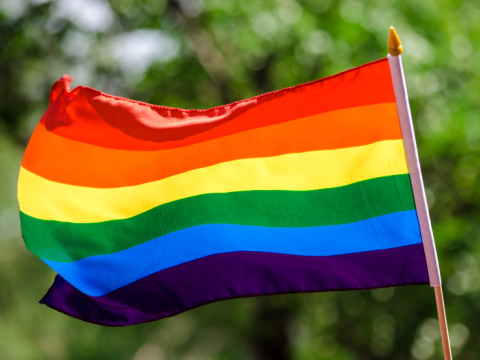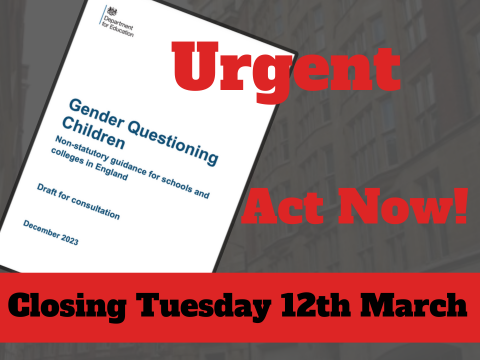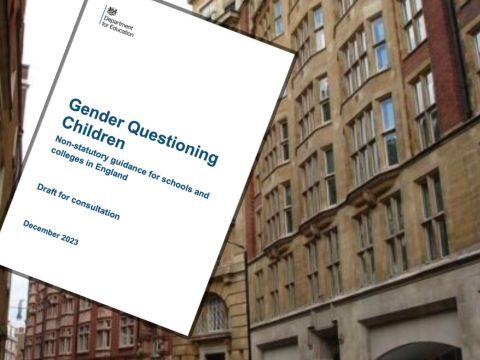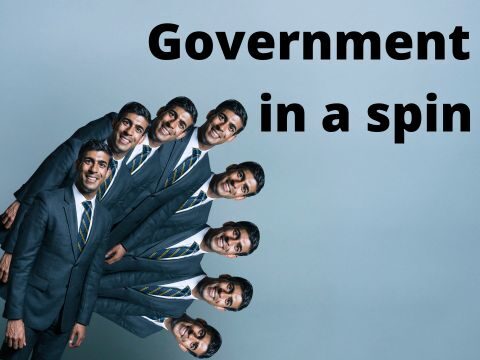

WARNING: Some of the content of this article may cause offence.
Acknowledged or not, highly sexualised exhibitions and performances are for eroding boundaries, with their challenges to established rules and understandings. Bystanders might suppress any unease or objection in their desire to fit in or not offend the ruling consensus.
To promote the Summer Reading Challenge, an annual children’s literacy event at Redbridge libraries, in 2021 performers were hired from Mandinga Arts, a ‘carnival, participatory and outdoor performance art organisation’ supported by Arts Council England. This sent a ‘rainbow dildo butt monkey’ or performer in an ape costume with a huge prosthetic dildo, nipples, buttocks and anus. On social-media posts, the library staff quipped ‘When you’ve got it, flaunt it’. Screenshots on the site and shared across social media show performers in giant penis and bottom costumes indulging in simulated sex acts. On the Redbridge Libraries Twitter account, the rainbow monkey rushes out of the library doors, gyrates on the side of the road, flaps his penis at passing traffic and bends over outside a Lidl displaying the buttocks.
Complaints were initially disregarded. Then, with local officials “in full ‘lessons learned’ mode”, blame was passed to the charity Vision Redbridge Culture and Leisure (RCL).” Council leader Jas Athwal said he was ‘disgusted’: MP Wes Streeting provided a condemnatory letter: the Mandinga Arts website was stopped for a holding page, and social-media feeds were deleted. Redbridge Libraries noted that ‘one of the animal costumes was inappropriate, which we were not aware of at the time of booking. We deeply apologise for the offence caused.’ The Labour leader later launched an investigation into how tax payers’ money was made available.[i]
How did inviting such an entertainer for a reading and libraries event go unquestioned until complaints arose? Somewhat disdainfully speaking of ‘offence caused’ to those who might perhaps be seen as narrow-minded, does not address the wider issues of relations between harmless adult fun, and modelling to children. Children do not know about social boundaries and, as acceptance is their default, they are vulnerable.
This raises the broader issue of encouraging children’s participation in Pride events with the appealing rainbow flags, drag queens, parades and glitter. Teachers and others may not be aware of how objections may relate to the presence of kinksters, and whether children should be exposed to displays for adult sexualities and identities. They may instead wish to see only the celebration of inclusivity, toleration and so forth, and fail to understand the anxieties of those to whom:


Izzy Montague was one of a number of parents raising concerns in 2018 about her son’s London primary school involving those as young as 4-5 years old in LGBT Pride and disallowing parental opt outs. The schools’ executive headteacher is described as antagonistic at a meeting, where another teacher wears a t-shirt with the message: ‘Why be racist, sexist, homophobic, or transphobic when you could just be quiet?’
Pride parades have their leather bondage gear, traps, chains and devil dog masks, lewd dancing, and near or complete nudity. When Prime Minister Teresa May in 2017, described the ‘celebrants’ of London Gay Pride as embodiments of ‘freedom’, ‘tolerance’, ‘equality’, ‘inclusion’, ‘diversity’ and ‘love’, perhaps this was in oversight of the pornographic displays. The crawling shackled youths, Nazified uniforms and giant phalluses may not be quite as prevalent in the UK as, for example, in the US. However, there is the virtually naked man on stilts leading others on chains and another on a float with a slim tape over his penis which disappears between his buttocks. Would sexually suggestive and sadomasochist displays take place in other contexts with children present? Scouts are among those marching.
In what someone describes as a “stunning social volte face”, shame has shifted from those who display their fetishes in public to those who question this behaviour. Complaints need not be transphobic or homophobic, since “shame has a useful and protective social function …it is not necessarily wrong to judge those who indulge in fetishes that might be harmful to others”. Questioning such celebration may derive less from a sexually repressed and closed mind than valid ‘safeguarding’ concerns, given sensitivity over sexual issues relating to children. Others agree that Gay Pride may have increased “acceptance in society” but, as a parent, opposes how “they keep insisting on involving kids and ‘kink’ in their parades…” Along with others, he is fully onside with consenting adults doing as they please at home, having sex with whomever and in any way they choose if this makes them happy.[iii]
A minority activist questions whether, with no fight left over for “justice or equality”, LGBTQ people may be left “fighting over whether kink and fetish have a place at Pride marches” with the only debate left “about harnesses, leather suits, ball gags”. There is the important reminder that while “fighting about the merit of nipple clamps on parade can seem facetious” it relates to that “older and ongoing tension that revolves around sexual identity and mainstream acceptance”. This reflects the fundamental and persisting divide between those involved in attaining equality in mainstream society, versus the drive for social transformation. Twenty-eight Pride flags now reflect a growing range of identities from trigender, to bear, to neutrois. Pride in London markets itself for, among others, trans, queer, questioning, intersex, non-binary, asexual, polysexual, genderqueer and gender variant people.
Activists complain how the LGBTQ fight for equal recognition and acceptance has been “stylized as a fight about what’s “normal” (e.g., loving someone regardless of your and their gender is a normal thing and should be accepted)”. This is a pursuit of respectability which they condemn for having led to “LGBTQ people compromising certain aspects of their lives for baseline recognition”.[iv] When even gay people are accused of imposing ‘respectability’ on kinky people, this means that they side with the oppressive forces of dull heteronormativity. Indeed, many who are lesbian, gay and bisexual no longer attend Pride parades for, as one explained:
Seeing the pictures of nearly naked blokes in dog masks being led by their masters on chains makes it harder to defend the position that it [Pride] isn’t all about sex. I would feel the same about any group or movement in society. Adult sexual activities and events based around that should take place in an indoor, adult-only setting… [Pride] a mainstream, commercial family day does not mix with people displaying adult sexual kinks.[v]
Should adult bystanders be exposed to “adult sexual kinks” any more than children? As explained, when someone’s fetish depends upon an audience or public validation, “choice” becomes a social matter. Consent should not be assumed because, whatever our views “we have a right not to be made bit players in another person’s public fantasy. It seems rules developed by communities of men online are seeping into the real world…”
In retaliation, the counter-culture militants allege that ‘respectability politics’ is “the wedging weapon that conservatives have always used against the queer community – getting us to turn against each other by always trying to live up to their ideas of what a human should be”.[vi] (This might overlook how activists advocated drawing on mainstream sentiments to secure rights.) It is emphasized how queerness, at its core, is a rejection of respectability and is:
…often about resistance to norms and embracing radical existence, so engaging in respectability politics — the idea that marginalized groups need to behave or act in a certain way to validate the compassion shown toward them — flies in the face of those goals.[vii]
In this context, arguments over “kink and cops” are seen to reflect “an existential crisis for Pride itself: Is there any political clout left in what’s considered an important celebration of LGBTQ rights? Is this fighting all for naught?” Similar points are made over big banks and retailers commodifying the commemoration of Pride and how “radically inclusive can queerness be if it’s sponsored by corporate entities?”[viii]
Joining the argument for rebels, Robin Dembroff, a professor at Yale, reminds everybody that “Queerness isn’t just about who you want to fuck, you know? Being queer is still fundamentally rooted in having a political resistance to hegemonic ideas of how humans ought to be,” The idea that you “can’t have kink and fetish on display because children might see”, something that Izzy Montague did not want her child exposed to, clashes with queer goals or “resistance to norms and embracing radical existence…”[ix] Instead of LGBTQ people conforming to get mainstream sympathy, the “mainstream culture” needs to “accommodate the humanity of the LGBTQ community as a whole”.
The publication of a survey by LGBT+ organisation ANIMAGI – a volunteer organisation founded to improve education and awareness within the Kink and Fetish, as well as wider LGBTQ+ communities – concluded that the representation of fetishists at Pride marches was actually too low. In response, there are the moves to embrace more ‘pups, furries and kinksters’ into the rainbow. This accompanies the proliferation of fetish communities online, where ‘human dolls’, ‘furries’ and ‘adult babies’ can swap tips and pornography in Facebook groups or on specialist sites. In addition, many organisations raise awareness of ‘lesser known identities’ across the sexuality, gender identity, expression, romantic and fetish spectrum. This includes MyUmbrellaLGBT+ which also promotes everything from ‘age play’ to ‘armpit fetishism’, replete with specially designed symbols and flags and a partnership with the LGBT Police group.[x] In an interview for The Guardian, a ‘human pup,’ called “for the pup community to be accepted”. His movement:
…grew out of the BDSM community and has exploded [sic] in the last 15 years as the internet made it easier to reach out to likeminded people. … human pups tend to be male, gay, have an interest in dressing in leather, wear dog-like hoods, enjoy tactile interactions like stomach rubbing or ear tickling, play with toys, eat out of bowls and are often in a relationship with their human “handlers”.[xi]
The writer talks how there “may well be many people on the high street who… squeeze into rubber dog costumes to role play their canine urges, but for the most part they do so in the privacy of their own homes.”
Not only should sexual fetishes be openly on display as part of Pride parades. Lauren Rowello (a ‘gendervague’ person married to a transgender woman) emphasizes how it is important that children be:
…reassured that alternative experiences of sexuality and expression are valid — no matter who they become as they mature, helping them recognize that their personal experiences aren’t bad or wrong, and that they aren’t alone in their experiences. … Kink visibility is a reminder that any person can and should shamelessly explore what brings joy and excitement. We don’t talk to our children enough about pursuing sex to fulfill carnal needs that delight and captivate us in the moment.
She talks about family trips to Pride parades where, after the children marched, one pointed:
… at a bare-chested man in dark sunglasses whose black suspenders clipped into a leather thong. The man paused to be spanked playfully by a partner with a flog. ‘What are they doing?’ my curious kid asked as our toddler cheered them on. The pair was the first of a few dozen kinksters who danced down the street, laughing together as they twirled their whips and batons, some leading companions by leashes. … my children were too young to understand the nuance of the situation, but I told them the truth: that these folks were members of our community celebrating who they are and what they like to do. [xii]
As the “queer community encompasses so many more non-traditional ways of being, living, and loving,” the “exclusion of kink from the pageantry of queers”, or of children from such displays, are construed as harmful attempts to homogenise self-expression. These are the “very attitudes that made Pride necessary — and life-affirming” by stopping heteronormativity being imposed on the next generation. (The social transformation enterprise does not allow choice when it comes to transgressive displays.) Rowella believes that sharing “the language of kink culture with young people” even provides them with “valuable information about safe sex practices — such as the importance of establishing boundaries, safe words and signals… and the need to seek and give enthusiastic consent.” This is unrealistic.
In what may well be how Pride is already “broadening what’s acceptable in the mainstream” along with the rejection of so-called ‘respectability politics’ the imparting of sexual variety to youngsters earlier and earlier is raising considerable problems.[xiii] Nicolle Russell asks whether “by this logic, we should allow, and encourage, children to observe an array of pornography and abuse on the internet.”[xiv] Maybe that is increasingly happening. Ironically, if respectability politics or norms of sexual conduct are rejected, as by Rowella, with this goes the social stigma that makes forbidden practices exciting in the first place and prompts the search for new outrages.
We may have embraced wholesale the idea that “anything goes” provided it’s “safe, sane and consensual”. But if the excitement of sexual taboos is precisely their forbidden-ness, then sooner or later someone will come for the taboo of consent itself — and especially on violating the consent of those who aren’t deemed able to consent in the first place: children and animals.[xv]
Mary Harrington quotes De Sade (from 120 Days of Sodom, 1785) where : “If it is the dirty element that gives pleasure to the act of lust, then the dirtier it is, the more pleasurable it is bound to be.” She then asks: “what happens when “dirty” proclivities are so normalised people are OK with their kids seeing them?”[xvi]
Patricia Morgan, writer and researcher
[i] Nikolic, I. Parents’ disgust as Labour council hires actor in rainbow coloured monkey costume with fake penis and nipples to appear at library event encouraging children to read. 12.07.2021 MAINONLINE. Bartosch, J. Dark side of the rainbow. 21.06.2021. The Critic
[ii] Russell, N. No, children do not need to see kink at Pride parades. 05.07.2021. Washington Examiner.
[iii] Stone, C. Pride is all well and good, but come on now, please – can you just leave the kids out of it? 01.07.2021. Question More.
[iv] Abad-Santos, A. The perpetual discourse over LGBTQ Pride, explained. 02.06.2021. Vox
[v] C. J. Liberty in Lesbian and Gay News. quoted by Bartosch, J. Dark side of the rainbow. Op cit.
[vi] Quoting Robin Dembroff, a professor at Yale who specializes in LGBTQ philosophy. Abad-Santos, A The perpetual discourse….
[vii] C. J. Liberty in Lesbian and Gay News. quoted by Bartosch, J. Dark side of the rainbow. Op cit.
[viii] Bartosch, J. Lesbian Pride, Lesbian Protest. 08.07.2018. https://medium.com › @josephinebartosch
[ix] Abad-Santos, A. The perpetual discourse … Op cit
[x] Bartosch, J. Pups, Furries & Kinksters have no place in Pride. 21.08.2020. The Critic.
[xi] Frizzell, N. The men who live as dogs: ‘We’re just the same as any person on the high street’. 25.05.2016. The Guardian.
[xii] Yes, kink belongs at Pride. And I want my kids to see it …
https://www.washingtonpost.com/outlook/2021/06/29/pride-month-kink-consent Also:
Washington Post author supports inclusion of kinks in Pride marches, celebrates taking her minor children to Pride rallies attended by kinksters in gay bondages. 30.06.2021.
Staff reporter at OpIndia.
[xiii] Harrington, M. Keep your Kinks to Yourself. 07.07.2021 UnHerd
[xiv] Russell, N. No, children do not need to see kink at Pride parades. 05.07.2021. Washington Examiner.
[xv] Harrington, M. Keep your Kinks… Op cit.
[xvi] Ibid






